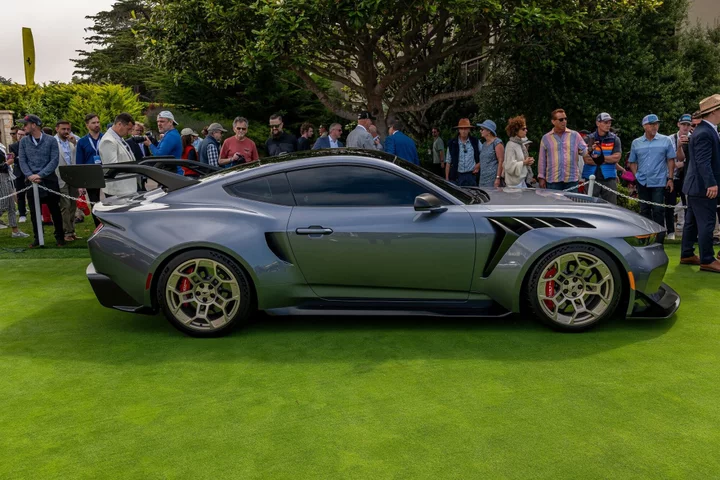When Ford Motor Co. debuted its $300,000 Mustang GTD in Carmel, California, Chief Executive Officer Jim Farley wasn’t shy about what he aimed to intimidate.
“We looked at what Porsche had done with their racing Porsches, and we thought we could do it even better,” Farley said during the Aug. 17 press preview.
The new car is a street-legal, limited-edition coupe with a supercharged 5.2-liter V-8 engine. Inspired by the Ford Mustang GT3 that’s slated to race in the 24 Hours of Le Mans next year and go into production late in 2024, it’s intended to elevate Ford in the eyes of driving enthusiasts who ordinarily would turn to European brands to fulfill their lead-foot inclinations.
Read more: Best Debuts at Monterey Car Week and Pebble Beach
“I want to see Porsche, I want to see Aston Martin, I want to see Mercedes sweat,” Farley said.
So when I speak privately the following day with the 61-year-old, self-described “car guy,” I’ve got plenty of questions. He has plenty to say, too. Here’s our conversation, edited for length and clarity.
Jim, you’ve said that when people drive a Porsche, it becomes part of society in a different way than just an automobile. Talk to me about what you mean by that—and what you mean when you say you want to make Porsche sweat.
I've been a car person my whole life, and when the 1973 Porsche 911 RS came out, it was a car that was different than the Detroit fast cars and different than Ferraris. It was a normal car that was light-weighted [stripped to essentials] and had a really good engine—and it was super well-balanced and it drove fundamentally different than anything else you could buy.
And then they replaced it with the Turbo over time, and that was really different, and they lost that light weight. And then the 1990s came about, and they started to rediscover that formula, and they started to build GT3s, GT2s, GT3 RSs, GT2 RSs. And now, the GT4 RS. And I watched all this happen as I’m working at Toyota, and then Ford—but I’m American, and I’m, like, well, why can’t we do that?
Because in 1988, I had a 5.0-liter Mustang. It was very competitive with the 911, but they built that whole business and the collectible market and the exclusivity of it and tied it to racing—a whole lifestyle. And we just did Shelbys. So that car has been in my head for 50 years, since I first saw the 1973 RS.
I didn’t understand why an American company couldn’t compete with the European elite as a challenger—but not do it in the normal American way, which is big wheels and tires and brakes and a big motor and flashy paint.
Right, because that’s not how Porsche is at all.
That’s not the way those cars got to be so special. It’s actually how all the pieces come together that makes those cars unique. So I think we’re an underdog to compete against those cars.
You just described a timeline at Porsche that you’ve followed closely. Where is Ford right now, on a parallel timeline?
I would say we’re kind of in the 1990s, when they first came out with their GT3 and GT2. They were only in Europe, actually. You almost didn’t even know they were actually there, and they didn’t market it. It was kind of a secret. Now, you can’t keep anything a secret. But I think, at the time, they were humble because they were committed to making a much better mousetrap. And I think we’re there.
What I guess I’m saying is: You gotta earn it. You can’t just put in tech and spend a bunch of money. It’s more complicated than that. You have to win races. You have to have the right people to drive the car. You have to pay attention to excruciating detail before people notice. You have to have different versions. You have to have the option list.
Perception trails reality.
People will notice after it’s already happened—and maybe a decade after. So that’s the long view ahead.
Is winning races about proving equipment and engineering, or is it about gaining attention from consumers as a winning brand?
I personally—as a CEO—think it’s definitely the latter. If you’re not in motor sports and you’re not successful, you’re not relevant to this world.
For the buyer [of the Mustang GTD] who can afford it and who appreciates it—who is going to have the patience to wait for it—that matters. They not only want their slice of that, they want to be associated with a brand that can beat the global competition.
Although in motorsports, you know, you lose more than you win. It's the only sport that happens that way.
I want to ask you about a common refrain with regard to this: the idea that Ford is the underdog. I’ve heard you say this a few times. But Ford has been saying that it’s the underdog since the 1960s, even since the days of beating Ferrari multiple times at the 24 Hours of Le Mans.
For sure.
So this also kind of feels like a convenient marketing thing: “We’re the underdog; we’re going to stick it to the Europeans.” Doesn’t that feed into an underdog mentality?
Yes.
And wouldn’t that be unhealthy?
No, it's the best thing ever.
Why is that?
Because I know how car companies work. And car companies get the best out of people when it’s a super-small challenger team that’s kind of off the radar and they have something to prove—and they have a huge chip on their shoulder. I don’t care if it’s a driver or an engineer. If they’ve got a chip on their shoulder, they are going to work harder than the establishment. And underdog is absolutely fundamental in creating a car like that.
Mustang is the bestselling sports car in the world. It often outsells the Porsche 911, even in Germany. Is “underdog” even accurate?
Yes, absolutely. Because it’s underdog based on who we’re going after. We are not the underdog when it comes to V-6 convertibles in Key West; we are not an underdog when it comes to renting a car in L.A. and driving up the coast of California. If you want a 5.0-liter GT and you want to do a burnout, we’re not the underdog. We are an underdog when we go to Le Mans against Porsche and Mercedes. Absolutely an underdog.
With new offers like this GTD and the Mustang Dark Horse, it seems like Ford is really doubling down on Mustang.
And Bronco.
And Bronco.
If there’s one thing I’ve learned—because I worked at Toyota for 25 years, and I competed against Ford—it’s that Ford is best when we do what comes natural to us, which is commercial vehicles. It’s a Bronco off-road, it’s Mustangs, it’s three-row crossovers—bigger vehicles. That’s what we do really well.
Are electric vehicles natural to Ford? You guys have faced some losses.
No, not at all. But the categories we’re going after are OK.
The Ford Lightning truck—actually, it’s not getting bought by Ford F-150 customers. It’s getting bought by almost all conquests [people who do not already own a Ford F-150]. It’s a completely different customer.
Has that dual mentality created some stress within the ranks, especially with General Motors and Tesla doing so well?
It’s a tension in the company, for sure. If any legacy [manufacturer] thinks that they could just walk in there and execute a half-decent EV and put their badge on and be successful, they’re wrong. Absolutely dead wrong.
If we don’t make the customer experience competitive with Tesla—with non-negotiated prices and no inventory and remote pick-up and delivery for all services—if we don’t get the tech in the vehicle right, if we don’t own the electric architecture, we’re not going to get those customers. They’re different than our core customers. It’s a conquest business. It’s hard.
Is it a challenge to blend those two mentalities within leadership at Ford?
I thought it was going to be really threatening for the establishment. But you know, the transition for the industry is so obvious to everyone, now that Tesla has been so successful. You don’t have to be a rocket scientist to figure out we have to go to a whole different way of executing an automobile.
I will tell you: If moving into EVs is a problem, those people won’t be on my leadership team for very long—because why should one person or a group of people threaten the sustainability of the company? No one is bigger than the success of Ford.
Porsche has said they will never make an electric 911. Would you say that you will never make an electric Mustang coupe?
I have to say, that’s kind of cherry-picking the reality. They’ll make an electric Cayman, they have the electric Taycan. We have the Mach-E, of course. But yes, I would say that’s a big discussion for Bill Ford and my team.
I don’t know about 10 years from now, but for the 10 years we’re in now, a partial electrification is the perfect solution for [high-performance] customers. You can cherry-pick the electric drivetrain to get everything you need from it, but you don’t have to walk away from the emotional part of the experience.
Is that the danger, that EVs lose the emotional connection to a car?
That’s the danger. When you get into a Pagani, when you listen to the Koenigsegg—when you drive it, it’s an emotional experience. People are buying those cars for emotional reasons.
We cannot keep saying [companies are] all-electric or all-hybrid, and there’s nothing in between. That’s baloney. There’s going to be lots of gray degrees of partial electrification that’s still good for the planet. You can still have that emotional experience. I think that's where we're going to be for a while.
So when you say: Could it be a fully electric Mustang coupe? Nah, probably not. But could there be a partially electrified Mustang coupe—and it be world-class? Yeah.
Let’s see what Porsche does. Let’s see if they take any electrification and put it in that 911. I find that pretty hard to believe.









